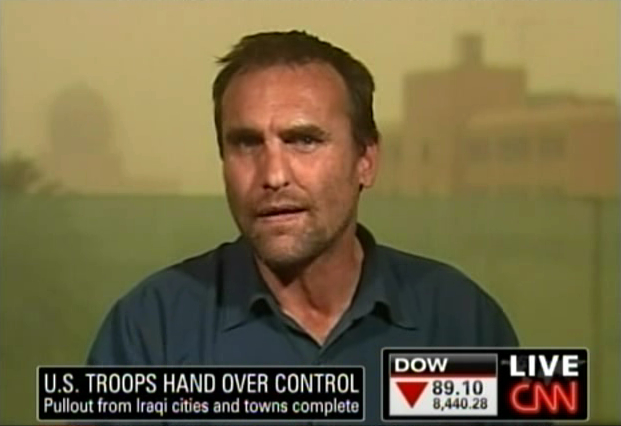NR: "One woman said to me, 'Finally I feel liberated.' "
June 30, 2009

Length: 5:34
LARGE (64.5 MB) ----- SMALL (6.8 MB)
Another look at the range of emotions unleashed by the handover.
BETTY NGUYEN: Hello, everybody. Welcome back on this Tuesday. You know, it is a landmark day in Iraq. The day U.S. troops have officially pulled out of the cities and towns, leaving the security in Iraqis own hands. We have seen several handover ceremonies and celebrations. You're looking at some of that. General Ray Odierno, commander of the Multi-National Forces, Iraq, spoke about the historic move just moments ago.
(BEGIN VIDEO CLIP)
ODIERNO: Here in Baghdad, you would know there is a significant change inside of the cities. There are thousands among thousands of soldiers that have pulled out of Baghdad. And there hasn't been any soldiers in the cities in southern Iraq. There hasn't been any soldiers in the cities, in Ramadi. There hasn't been soldiers in the city of Fallujah for months now and we've been executing this very well. So, again, here in Iraq, you would see it for yourself, there is a significant change.
(END VIDEO CLIP)
NGUYEN: CNN's Michael Ware has been watching the action from the capital, in Baghdad, and he joins us now. As we heard the General say, Michael, this has been happening for months now. This is just the final culmination of it. But at the same time, when you see the celebration in the streets, is it mixed emotion, mixed reaction when it comes to the U.S. troops who spent so much time and risked so many of their lives fighting in this cause?
MICHAEL WARE, CNN CORRESPONDENT: You've touched upon what I believe is something of a sensitive issue here. Now, look, first, look at it from the Iraqi perspective. As well-intentioned as it was, for the Iraqis, what they feel they've been living under since March 2003 is a foreign occupation. And we're talking about a fiercely proud and a fiercely nationalist people. They're tired of having a foreign tank of any kind in their street. Foreign troops storming into their houses at night and dragging their menfolk off to foreign-run prisons.
I mean, that's why they're calling this National Sovereignty Day. Over and over, I'm hearing, "Iraq for Iraqis." So, this is an explosion of that kind of release. One woman said to me, "Finally, I feel liberated."
Now, for the Americans, it's a different story. It's a very -- it's not simple -- it's complicated, mixed emotions. Certainly I know within the U.S. mission here, there is some sense of agrievement at the fact that the Iraqis so openly celebrated, that today is a national holiday, that state TV was running a countdown fonted on its screen to the handover. Anchors draped in Iraqis flags. Some of the Americans here feel that belies the sacrifice that's been made.
Now, four soldiers were killed just yesterday in the last hours of the U.S.-led war. That means that by the end of the U.S. phase of this war, the U.S. command, 4,324 American servicemen and servicewomen laid down their lives on Iraqi soil. And some are uncomfortable with the nature of these celebrations. And, indeed, you know, General Odierno himself was too busy to attend the official Iraqi ceremony this morning. I think, perhaps, there might be a time for America to pause today for a moment to take some silence and for America to think about those who lost their lives and gave them voluntarily here in Iraq. Betty?
NGUYEN: Well said, Michael. Let me ask you something very quickly. With this handover, are Iraqi security forces prepared for what's to come?
WARE: Well, they're as prepared as they're going to be. I mean, they certainly aren't the security forces they were several years ago. They're still comprised of large chunks of the militias. There's been lots of work done to try to reconcile all the sides under one uniform, one banner. But at the end of the day, if things go badly, you will see the men within these uniforms choosing sides.
Also, they simply don't have the combat power to entirely fight the fight they may face. That's why the Americans are staying here. 130,000 troops, American soldiers, Marines, Air Force, Navy are still here. And they are going to be for some time; under President Obama's plan till August, under the agreement the Bush administration signed, they're allowed to stay for another 18 months.
They're underwriting the stability. They're the insurance policy, but, they take a back seat role. They're in a supporting role now. They can only operate in the urban environments at the behest of the Iraqi government. So, even if they know where there is a bad guy, even if they want to go out and get something or stop something, they have to ask permission or wait until they're invited, Betty.
NGUYEN: All right. CNN's Michael Ware joining us live from a sandstorm there in Baghdad, as we've seen many times. Thank you, Michael.
Here are some numbers that we think are very important when you look at the American involvement in Iraq. There are currently 131,000 US troops in Iraq, now all of them outside the major cities of Iraq. At the height of the so-called surge the US had 168,000 troops in the country. As we just heard from Michael Ware, 4,324 US troops have died in Iraq. 31,354 have been wounded in operations there.
